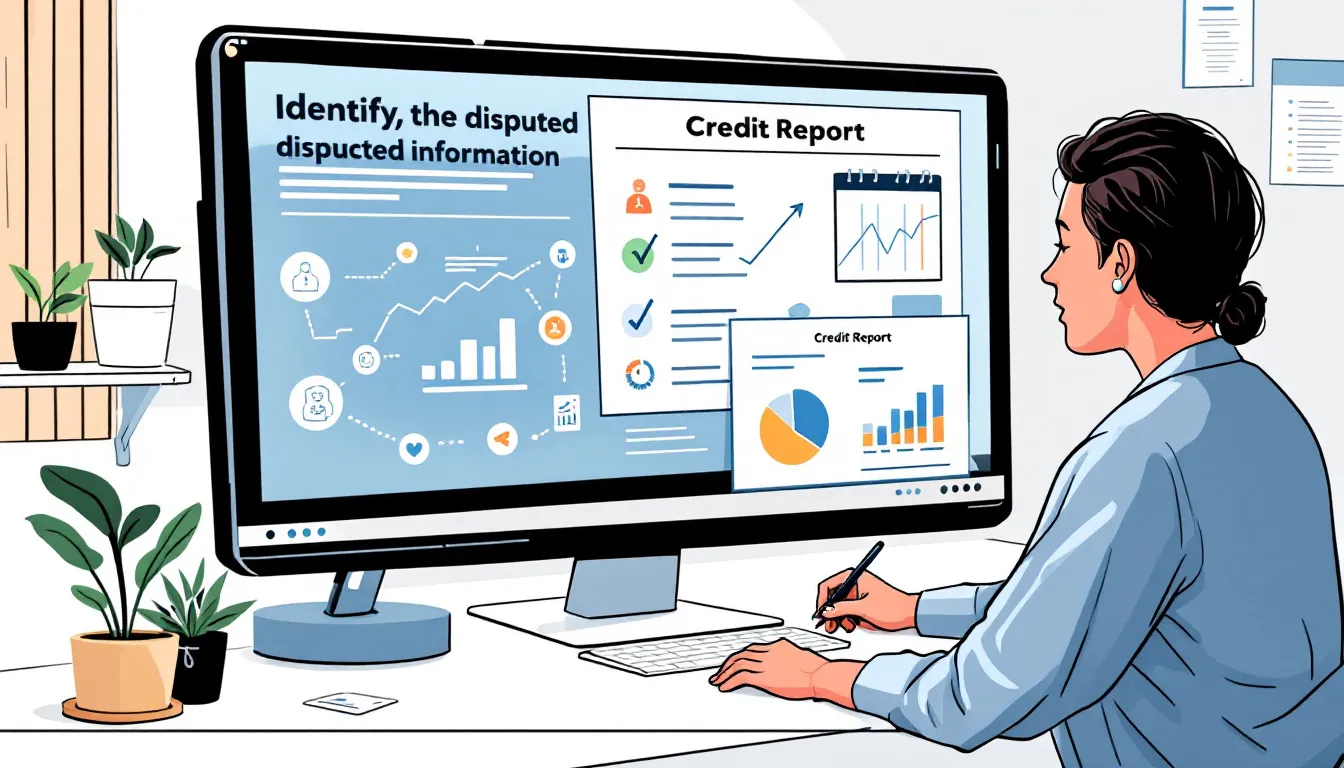If you’ve found errors on your Equifax credit report, disputing them quickly is crucial. This article will guide you through Equifax: how to dispute inaccuracies using online, phone, and mail methods. Taking steps to correct these errors can improve your credit health.
Key Takeaways
-
Equifax provides multiple methods to dispute errors on your credit report, including online, by phone, and through the mail, each offering unique advantages.
-
Equifax is one of the nationwide credit bureaus responsible for maintaining credit reports, along with Experian and TransUnion.
-
Gathering supporting documents is critical for substantiating your dispute, and submitting requests via certified mail ensures proof of delivery and tracking.
-
Monitoring your credit report regularly is essential for detecting discrepancies early, and consumers are encouraged to utilize free resources to maintain their credit health.
Disputing Errors on Your Equifax Credit Report
Addressing errors on your Equifax credit report is crucial for keeping a strong credit profile. Errors can occur for various reasons, such as clerical mistakes, identity theft, or outdated information. Credit bureaus, including the three nationwide credit bureaus—Equifax, Experian, and TransUnion—are responsible for maintaining and reporting your credit information. Fortunately, Equifax offers multiple avenues to dispute these errors, ensuring that you have the flexibility to choose the method that best suits your needs.
You can dispute errors using the following methods, each with its own advantages and considerations:
-
Online: The fastest and most convenient way to address inaccuracies, allowing you to submit and track disputes with ease.
-
By phone: Provides direct interaction with customer service representatives for those who prefer a more personal touch.
-
Through the mail: Allows for detailed documentation and a tangible paper trail.
Before filing a dispute with the credit bureaus, it is recommended to contact the lender directly to attempt to correct any inaccurate information, as lenders play a key role in maintaining accurate credit report data.
Fixing mistakes on your credit report is vital for your financial well-being and is a cost-free process. Errors can originate from lenders, so contacting the lender may help resolve the issue before disputing with the credit bureaus. The lender or data furnisher is the entity that provides information to Equifax, and contacting the data furnisher directly can sometimes expedite the correction process. Acting promptly ensures your credit report accurately mirrors your financial history, aiding in securing better interest rates and financial opportunities. Let’s delve into the specifics of each dispute method to help you choose the best path forward.
Online Dispute Process
Equifax’s online dispute services provide the fastest method to address errors on your credit report. To initiate an online dispute, visit Equifax’s dedicated dispute services webpage. Here, you can file a dispute by providing your personal information, identifying the error, and uploading any supporting documents. As part of the online dispute process, you can upload documents directly to support your claim. The online platform is user-friendly, guiding you through each step of the process with clear instructions and helpful tips.
Disputing online offers unparalleled convenience, including:
-
Immediate acknowledgment of your dispute request
-
The ability to track the status of your dispute in real-time
-
Receiving a confirmation number after submitting your dispute online, which can be used to track the status of your dispute
-
Transparency that ensures you are always informed about the progress of your dispute investigation
-
Access to the dispute center for updates and final dispute results
The online platform allows you to dispute information quickly and efficiently, making it easier to correct inaccurate or outdated details on your credit report.
Disputing by Phone
If you prefer a personal approach, disputing errors by phone is effective. Here’s how to do it:
-
Contact Equifax’s customer service at 866-349-5191 to initiate a dispute.
-
Have your credit report details ready when choosing this method.
-
Provide the representative with your credit report information so they can process your dispute efficiently.
Disputing by phone enables direct interaction, allowing you to ask questions and receive immediate responses from customer service representatives. This can be particularly helpful if you need clarification on specific issues or require assistance in understanding the dispute process.
Keep records of your conversation and any guidance provided by the representative for future reference. Request a reference number for your phone dispute, as this can be used for tracking and follow-up.
Disputing by Mail
Addressing errors by mail offers a thorough and detailed approach. Include copies of supporting documents and a detailed written explanation of the error when sending your dispute via mail. Providing strong supporting evidence is crucial, as it can significantly strengthen your dispute and improve your chances of a favorable outcome. This method is particularly beneficial for those who prefer to have a tangible record of their dispute and supporting documentation that addresses the issue.
To ensure your dispute is received and processed effectively:
-
Use certified mail to provide proof of mailing and delivery, giving you peace of mind that your dispute has reached its destination.
-
Include a dispute form with your submission.
-
Highlight the disputed information on your credit report copy to make your dispute request clear and concise, increasing the likelihood of a successful resolution.
What Information Can Be Disputed?

Knowing what information can be disputed is key to effectively addressing errors on your credit report. Inaccuracies can arise in several areas, including:
-
Personal details
-
Account statuses
-
Public records You have the right to dispute any inaccurate or incomplete information that appears on your credit report.
Negative information, such as late payments or bankruptcies, can only be disputed if it is inaccurate or incomplete; otherwise, accurate negative information will remain on your credit report for a set period of time.
Personal identifiers and credit report components that must be accurate or can be disputed include:
-
Personal identifiers such as your name, address, and Social Security number
-
Account statuses, such as accounts reported as open when they are actually closed
-
Public records like bankruptcies or tax liens that are incorrect
Collecting relevant information and preparing thoroughly will strengthen your dispute request by providing additional relevant information that has been completed.
Gathering Supporting Documents
Supporting documents play a crucial role when disputing information on your credit report. These can include bank statements, utility bills, identification, and proof of payment. Collecting copies of billing statements and other relevant documentation can help substantiate your claims and provide evidence to support your dispute.
Identification documents like a driver’s license or passport are important to verify your identity during the dispute process. Having all necessary documentation organized and ready to submit will streamline the dispute process and increase the likelihood of a successful resolution.
Preparing Your Dispute Request
Crafting your dispute request requires careful attention to detail. Highlighting the disputed items in your credit report copy clarifies which entries you are contesting. Documenting correspondence with creditors provides valuable evidence to support your dispute and demonstrates previous attempts to resolve the issue. Include copies of supporting documents and a detailed written explanation of the error when sending your dispute via mail. Providing a clear written statement outlining the nature of the dispute can help clarify your position.
Systematically organizing your documents is crucial. This includes letters from lenders indicating corrections made to accounts or evidence of identity theft. Thoroughly preparing your dispute request increases the chances of a successful outcome and ensures your credit report accurately reflects your financial history, especially in the case of credit report disputes.
After submitting your dispute, you may receive a notice from the credit bureau if additional information is required or if your dispute is considered frivolous.
What Happens After You Submit a Dispute?
After submitting a dispute, Equifax must investigate and report back with the results. This process typically takes up to 30 days to conclude. During the investigation, Equifax reviews the disputed information and contacts the creditor or data furnisher to verify its accuracy.
Once the investigation is complete, Equifax must provide a written summary of the findings and an updated credit report if any changes were made. Equifax will also send a notification letter detailing the outcome of your dispute. If the disputed information is incorrect, the creditor must notify Equifax to amend or remove the erroneous details.
what happens after you submit a dispute keeps you informed and ensures the process is carried out correctly. The dispute process is similar for other credit bureaus, such as Experian, which also allows you to review your credit report, submit disputes online, by mail, or by phone, and monitors changes to ensure your credit information is accurate.
Investigation Timeline
Equifax must investigate disputes promptly. Key points about the investigation process include:
-
The credit reporting agency usually completes its investigation within a maximum of 30 calendar days, but in some cases, the dispute may be resolved in fewer business days depending on the complexity.
-
Consumers can expect results within this timeframe.
-
This timeframe is crucial for financial planning and credit management.
Knowing the investigation timeline is important to understand your rights and what to expect during the dispute process. Being aware of the timeline allows you to follow up appropriately and ensures your dispute is handled efficiently.
Possible Outcomes
Disputing an item on your credit report can lead to various outcomes:
-
The disputed information may be verified.
-
The disputed information may be corrected.
-
The disputed information may be deleted based on the investigation’s findings.
If a business finds the information inaccurate, it must inform the credit bureau to update or delete it.
Successful dispute outcomes can greatly improve the accuracy of your credit report and enhance your creditworthiness. A favorable dispute outcome can lead to a better credit score and improved chances of obtaining loans or credit.
If you disagree with the outcome, you can request a reinvestigation, which prompts Equifax to review the disputed information again.
Tracking Your Dispute Status
Monitoring the status of your dispute is essential to stay informed about its progress. You can track your dispute through the myEquifax account using a specific status-check button. You may need your case number to access the status of your dispute. If you submitted your dispute online and have a confirmation number, Equifax sends periodic email updates regarding its status.
For disputes submitted by phone, you can choose to receive the outcome via email or postal mail. For disputes initiated by mail, Equifax communicates the results via postal mail. Tracking your dispute status ensures you stay updated on its progress and final resolution.
Impact of Disputes on Your Credit
Filing a dispute does not directly affect your credit score but may lead to changes if the disputed information is corrected. Changes to personal information like name or address do not impact credit scores as they are not considered in score calculations. However, successfully removing incorrect late payments or inquiries through disputes can improve your credit score.
If unsatisfied with the dispute outcome, you can add a statement to your credit file to express your position on the disputed information. This is known as a statement of dispute. This statement provides additional context to lenders and creditors reviewing your credit report.
Steps to Take if You Disagree with the Outcome
If dissatisfied with the dispute outcome, you can submit a complaint to your state attorney general or the Consumer Financial Protection Bureau. Filing a complaint with regulatory bodies ensures your concerns are addressed appropriately if a credit reporting company does not handle your dispute adequately. You may also escalate your dispute by contacting higher-level support within the company or seeking legal assistance.
Be aware of the following when dealing with lawsuits against credit reporting companies:
-
Time limits apply for filing a lawsuit, so it’s essential to know these deadlines.
-
Consulting a lawyer can provide additional assistance if your dispute remains unresolved.
-
You may qualify for free legal services.
Regular Monitoring of Your Credit Reports
Consistently monitoring your credit reports is crucial for maintaining a healthy credit score and catching errors early. Regularly reviewing your credit reports helps identify discrepancies before they negatively impact your creditworthiness. Errors like incorrect personal information, fraudulent accounts, or inaccurate account statuses can be quickly addressed through timely monitoring.
U.S. residents can get free copies of their credit reports from each major credit bureau once every 12 months through AnnualCreditReport.com. Additionally, until 2026, Equifax offers six free credit reports per year, offering ample opportunities to stay updated on your credit status.
Many banks and financial institutions offer complimentary credit monitoring services to help you track changes to your credit report.
For additional protection against unauthorized access or fraud, consider placing a credit freeze on your credit file.
Free Resources for Monitoring
Using free resources for credit monitoring helps you stay informed about your credit status and catch errors early. Besides AnnualCreditReport.com, Equifax powering the world provides tools for consumers to track their credit reports and receive alerts about changes. These tools offer valuable insights into your credit health and alert you to potential issues before they become significant problems.
Regularly monitoring your credit report is essential for maintaining good credit health and promptly addressing any discrepancies. Using these free resources helps you stay on top of your credit and take proactive steps to protect your financial future.
You can also place a free fraud alert on your credit file to warn potential lenders of possible identity theft.
Reporting Fraud and Scams
Reporting fraud and scams is essential for protecting your credit and financial well-being. If you suspect identity theft, file reports at IdentityTheft.gov, which offers guidance and resources for recovery. Contact the FTC online at IdentityTheft.gov or call 1-877-438-4338 to report identity theft.
Visit ReportFraud.ftc.gov to report fraud, scams, or unethical business practices. Using certified mail when dealing with identity theft provides an official record, ensuring your reports are received and processed.
These steps help address fraud and scams effectively and safeguard your credit and money.
Additionally, placing a security freeze on your credit report can help prevent further unauthorized access after experiencing fraud or identity theft.
Summary
Maintaining an accurate Equifax credit report is essential for your financial health. Disputing errors through online platforms, phone, or mail ensures that your credit report reflects your true financial history. By understanding what information can be disputed and preparing a thorough dispute request, you increase the chances of a successful resolution.
Regularly monitoring your credit reports and utilizing free resources can help you catch errors early and protect your credit score. If you encounter fraud or scams, reporting them promptly can safeguard your financial well-being. Take control of your credit today, and ensure your credit report is accurate and up-to-date.
Frequently Asked Questions
How do I dispute an error on my Equifax credit report?
To dispute an error on your Equifax credit report, you may do so online, by phone, or via mail, all of which necessitate a detailed explanation of the error along with supporting documents. Ensure you provide clear and accurate information to facilitate the resolution process. When you file your dispute, you will receive a dispute reference number, which can be used to track its progress.
What types of errors can be disputed on my credit report?
You can dispute inaccuracies concerning personal details, account statuses, public records like bankruptcies or tax liens, and collection accounts on your credit report. Addressing these errors promptly can help maintain a healthy credit profile.
How long does the dispute investigation take?
The dispute investigation generally takes up to 30 calendar days, after which Equifax will provide a written summary of the findings and an updated credit report if any changes are made.
Will disputing an error affect my credit score?
Disputing an error will not directly impact your credit score; however, resolving inaccuracies may improve your score over time. Items under pending investigation may be temporarily flagged on your credit report. It’s beneficial to address any discrepancies for a healthier credit profile.
What should I do if I’m not satisfied with the dispute outcome?
If you are not satisfied with the dispute outcome, you should file a complaint with your state attorney general or the Consumer Financial Protection Bureau, and consult a lawyer for additional guidance. You can also add a statement to your credit file explaining your side of the dispute. Additionally, you may submit a supplemental statement to further clarify your position regarding the disputed information.



